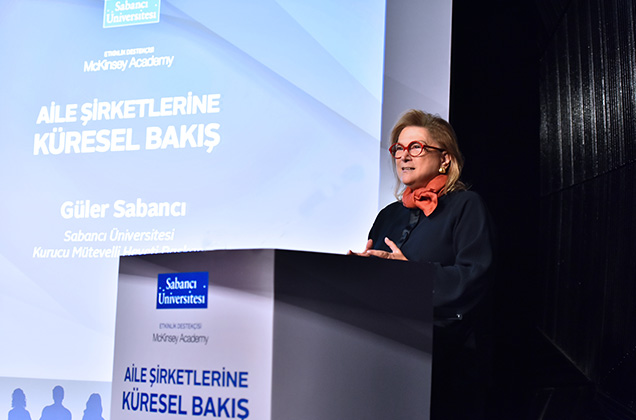09/10/2017
"Family companies need to grow and open to the world if Turkey is to have a say in the global economy"

Sabancı University Founding Board of Trustees Chair Güler Sabancı:
• Family companies are expected to account for 40% of the world's largest companies by 2025.
• Family companies need to be long-lived and have a global brand value for consistent economic, social and cultural growth in Turkey.
• To grow their businesses, the new generation of executives need education as well as a firm grasp on recent developments, have to continuously reinvent themselves in the face of competition, and be open to learning and training.
The Sabancı University School of Management held a conference titled "A Global Look at Family Business" at the Sabancı University Sakıp Sabancı Museum the Seed on Wednesday, October 4, 2017. Held in association with McKinsey Academy and Columbia Business School, the conference introduced a global perspective on family companies, discussed the experiences of Turkish family companies on the path to incorporation, and explored the expectations of future generations.

Introductory remarks were delivered by Sabancı University Founding Board of Trustees Chair Güler Sabancı and School of Management Dean Füsun Ülengin.

Sabancı University School of Management Dean Füsun Ülengin said that family companies were icebergs that formed the backbone of the economy beneath the surface. Ülengin noted that a particularly important question in the cross-generational sustainability of family companies was making the right choice regarding success criteria. Füsun Ülengin explained that the conference would focus on whether family companies that had a cross-generational track record of success had a long-term sustainable policy for entrepreneurship, and discover what their governance approach was, how their organizational culture that ensures the loyalty of their employees were shaped, and what methods the younger members of the families pursued in order to run the business with as much passion and responsibility as the founding generation.
“Sabancı University starts a groundbreaking university-business partnership platform geared towards family companies that comprise the backbone of the economy"
Sabancı University Founding Board of Trustees Chair Güler Sabancı began by saying that Sabancı University started a groundbreaking university-business partnership platform geared towards family companies that comprise the backbone of the economy. She added that family companies had a special place not just in the Turkish economy, but in the global economy as a whole. Referring to a study by McKinsey, Güler Sabancı said that family companies were expected to account for 40% of the world's largest companies by 2025. Explaining that almost 95% of all businesses in Turkey were family companies, Güler Sabancı continued, “According to data by the Statistics Institute of Turkey and the Istanbul Chamber of Commerce, the average life expectancy of a family company in Turkey is 25 years. Only 30% of these companies survive to the second generation, and 12% to the third. Those which survive to the fourth generation are a meager 3%." Güler Sabancı also said that only 69 companies which were founded before the proclamation of the Republic in 1923 were still in business today.
Sabancı said, "Family companies need to be long-lived and have a global brand value for consistent economic, social and cultural growth in Turkey."
"To grow their businesses, the new generation of executives need a firm grasp on recent developments, have to continuously reinvent themselves in the face of competition, and be open to learning and training"
Saying that the second- and third-generation members of family companies around the world received education in the best schools available, Sabancı remarked that knowledge evolved and developed at the same rate as the advancement of technology. Sabancı said that to grow their businesses, the new generation of executives needed education as well as a firm grasp on recent developments, had to continuously reinvent themselves in the face of competition, and be open to learning and training.
Güler Sabancı likened successful corporations to successful individuals, continuing, “Successful people have a number of key common points: their perspective on the world; keenness on research; focus on being constructive and solution-oriented; good planning of resources; and being open to new developments and lifelong learning. We see the same attributes in family companies that have a consistently rising graph." She said that, like successful individuals, successful companies also sought advice from experts, did research, consider different opinions, had a solution-oriented and constructive approach, and planned and used their resources effectively.
"Family companies need to grow and open to the world if Turkey is to have a say in the global economy"
Güler Sabancı said that ensuring the viability of family companies from one generation to another was critical in achieving sustainability, and argued that family companies always needed to embrace a development-focused mindset. She added that both current and prospective executives in family companies had a great duty to achieve this.
Güler Sabancı concluded by saying "Turkey needs to have family companies, and family companies need to grow and open to the world from one generation to the next if Turkey is to have a say in the global economy."

Following introductory remarks, the first panel session, titled "The European and Eurasian Perspective," was moderated by Sabancı University School of Management faculty member and Corporate Governance Forum Director Melsa Ararat with panelists Patricia Angus from Columbia Business School and Amadeo Di Lodovico, Senior Partner of McKinsey Dubai.

The second panel, moderated by Bloomberg HT News Coordinator Ali Çağatay, was titled “Family Business in Turkey”. Panelists were Leyla Alaton, Sumer Tömek Bayındır and Tayfun Bayazıt.

The moderator of the final panel on "The Expectations of Future Generations" was Arzu Maliki from Bloomberg HT, and panelists were Murat Özyeğin, Ebru Özdemir and Alp Öğücü.





